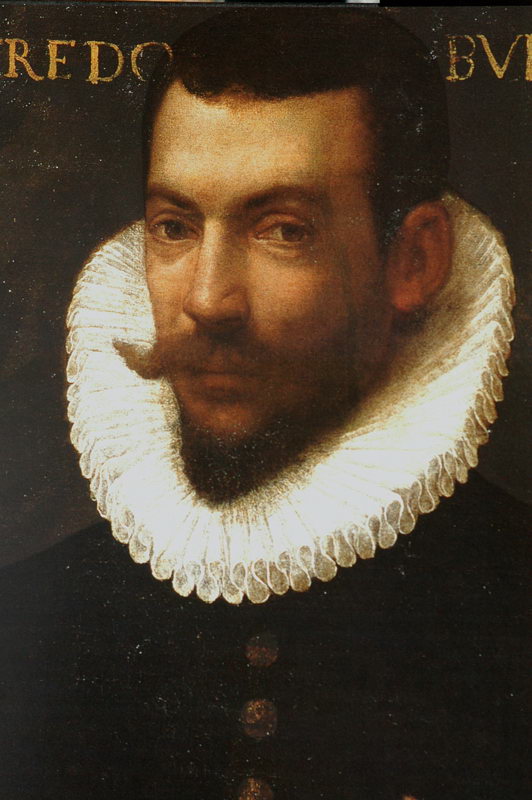Giunta è tua gloria al sommo e per lo innanzi
Fuggir le dubbie guerre a te conviene,
Ch' ove tu vinca sol di stato avvanzi
Nè tua gloria maggior quindi diviene;
Mal' Imperio acquii'tato e prefo dianzi
El' onor perdi, se 'l contrario avviene.
Canto II, stanza 67 (tr. Fairfax)
Gerusalemme Liberata (1581)
Torquato Tasso Quotes
“For shield and mail are less secure defence
To the bare breast than holy innocence.”
Difesa miglior, ch'usbergo e scudo,
È la santa innocenza al petto ignudo.
Canto VIII, stanza 41 (tr. Alex. Cuningham Robertson)
Variant translation: Better defence than shield or breastplate, is holy innocence to the naked breast!
Gerusalemme Liberata (1581)
O fortunati miei dolci martiri!
S'impetrerò che giunto seno a seno,
L'anima mia nella tua bocca io spiri.
Canto II, stanza 35 (tr. Fairfax)
Gerusalemme Liberata (1581)
Ride Armida a quel dir: ma non che cesse
Dal vagheggiarsi, o da' suoi bei lavori.
Poichè intrecciò le chiome, e che ripresse
Con ordin vago i lor lascivi errori,
Torse in anella i crin minuti, e in esse,
Quasi smalto su l'or, consparse i fiori:
E nel bel sen le peregrine rose
Giunse ai nativi giglj, e 'l vel compose.
Canto XVI, stanza 23 (tr. Wickert)
Gerusalemme Liberata (1581)
“Modesty restrains weak love,
but it is a weak bridle to powerful love.”
Act V, scene i.
Aminta (1573)
Hor, non sai tu, com'è fatta la donna?
Fugge, e fuggendo vuol, che altri la giunga;
Niega, e negando vuol, ch'altri si toglia;
Pugna, e pugnando vuol, ch'altri la vinca.
Act II, scene ii.
Aminta (1573)
Là corre il mondo, ove più versi
Di sue dolcezze il lusinghier Parnaso;
E che 'l vero condito in molli versi,
I più schivi allettando ha persuaso.
Canto I, stanza 3 (tr. Anthony Esolen)
Gerusalemme Liberata (1581)
“Eròtimo cries: 'Not science (I am sure)
nor my poor mortal hands here work your cure.”
Grida Erotimo allor: l'arte maestra
Te non risana, o la mortal mia destra.
Canto XI, stanza 74 (tr. Wickert)
Gerusalemme Liberata (1581)
Femina, cosa mobil per natura,
Più che fraschetta al vento, e più che cima
Di pieghevole spica.
Act I, scene ii. Compare: "Varium et mutabile semper femina", Virgil, Aeneid, 4.569.
Aminta (1573)
“With equal rage, as when the southern wind,
Meeteth in battle strong the northern blast.”
Canto IX, stanza 52 (tr. Fairfax)
Gerusalemme Liberata (1581)
In che picciolo cerchio, e fra che nude
Solitudini è stretto il vostro fasto!
Lei, come isola, il mare intorno chiude;
E lui, ch'or Ocean chiamate or vasto,
Nulla eguale a tai nomi ha in sè di magno;
Ma è bassa palude, e breve stagno.
Canto XIV, stanza 10 (tr. Wickert)
Gerusalemme Liberata (1581)
“The time for work is while the sun's light shines,
but every living thing finds peace at night.”
Tempo è da travagliar mentre il sol dura;
Ma nella notte ogni animale ha pace.
Canto VI, stanza 52 (tr. Wickert)
Gerusalemme Liberata (1581)
“You, Honor, you first veiled
The fountains of delight,
Denying those waves to the thirsting lovers.”
Tu prima, Onor, velasti
La fonte dei diletti,
Negando l'onde a l'amorosa sete.
Act I, Choro, line 358.
Aminta (1573)
“Black was this queen as jet, yet on her eyes
Sweet loveliness in black attired lies.”
Bruna e si, ma il bruno il bel non toglie.
Canto XII, stanza 21 (tr. Fairfax)
Gerusalemme Liberata (1581)
“Yield, and sufficient glory let it be
to have it said that you once fought with me.”
Renditi vinto, e per tua gloria basti
Che dir potrai che contra mie pugnasti.
Canto VI, stanza 32 (tr. Wickert)
Gerusalemme Liberata (1581)
“The way to honor, way to safety is.”
La via d'onor della salute è via.
Canto XX, stanza 110 (tr. Fairfax)
Gerusalemme Liberata (1581)
“The world grows old,
and growing old, withers away.”
Il mondo invecchia,
E invecchiando intristisce.
Act II, scene ii.
Aminta (1573)
“For what the most neglects, most curious prove,
So Beauty's helped by Nature, Heaven, and Love.”
Canto II, stanza 18 (tr. Fairfax)
Gerusalemme Liberata (1581)
“I'll know his inmost aims and (doubt me not)
extract the guarded mysteries of his mind.”
Vantomi in lui scoprir gl'intimi sensi,
E i secreti pensier trargli del petto.
Canto XVIII, stanza 59 (tr. Wickert)
Gerusalemme Liberata (1581)
Qual vento a cui s'oppone o selva o colle,
Doppia nella contesa i soffj e l'ira;
Ma con fiato più placido e più molle
Per le campagne libere poi spira.
Come fra scoglj il mar spuma e ribolle:
E nell'aperto onde più chete aggira.
Così quanto contrasto avea men saldo,
Tanto scemava il suo furor Rinaldo.
Canto XX, stanza 58 (tr. Fairfax)
Gerusalemme Liberata (1581)
“Newborn Love has short wings. He can scarcely
hold them up, and does not spread them out to fly.”
Act II, scene ii.
Aminta (1573)
“Oh Dafne,
you truly had pitiless pity
when you stayed my dart.”
Dispietata pietate
Fù la tua veramente, ò Dafne, allhora,
Che ritenesti il dardo.
Act III, scene ii.
Aminta (1573)
